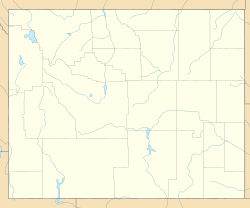Horner Site facts for kids
|
Horner Site
|
|
| Location | On a bluff overlooking the confluence of Sage Creek and the Shoshone River, 5 miles (8.0 km) east of Cody, Park County, Wyoming, USA |
|---|---|
| Nearest city | Cody, Wyoming |
| NRHP reference No. | 66000758 |
Quick facts for kids Significant dates |
|
| Added to NRHP | October 15, 1966 |
| Designated NHL | January 20, 1961 |
The Horner Site is a very important archaeological site (a place where people study old human history) located near Cody, Wyoming. It's also known as the Creek Site or Horner's Corner Site. This site is special because it's the "type site" for something called the Cody complex. In 1961, it was named a National Historic Landmark, which means it's a place of great historical importance.
Contents
The Horner Site: An Ancient Discovery
Where is the Horner Site?
The Horner Site is found in the foothills of the Absaroka Range mountains. It sits on a flat piece of land that looks over where Sage Creek meets the Shoshone River. This spot is just east of the town of Cody.
The land here is quite flat. In the past, some parts of it were used for farming. However, the specific area where the ancient discoveries were made has not been farmed since it was found. The site is on the western edge of the Bighorn Basin. This area is thought to have once been home to many ancient buffalo, known as Bison antiquus.
Uncovering History: The Digs
The Horner Site was first discovered in 1939 by a local collector. At that time, the land belonged to Pearl Horner. In 1948, the collector told Glen Jepsen about his finds. Jepsen was an archaeologist from Princeton University.
Jepsen had been working on other digs in the Bighorn Basin. He quickly organized the first official excavations at the Horner Site. These digs began in August 1949. Over the next three years, many more excavations took place. These digs gained national attention and were visited by many scientists. These scientists were studying the early history of people in North America.
The site became very important for a special reason. It was the first place where two types of ancient spear points, called Eden and Scottsbluff points, were found together. They were also found in layers of earth that could be accurately dated. This discovery helped scientists understand the Cody complex, a specific period and culture of ancient people.
Protecting the Site
Because the Horner Site received a lot of public attention, it faced some challenges. In the years after its discovery, people illegally collected artifacts from the site. This activity damaged the site to some extent.
However, archaeologist George Frisson wrote in 1987 that the site was still very important. He believed this was due to its unique location and what it could still teach us. Scientists know that some deeply buried artifacts remain at the site. These are not easy for amateurs to find. This means the Horner Site still holds many secrets about ancient times.



